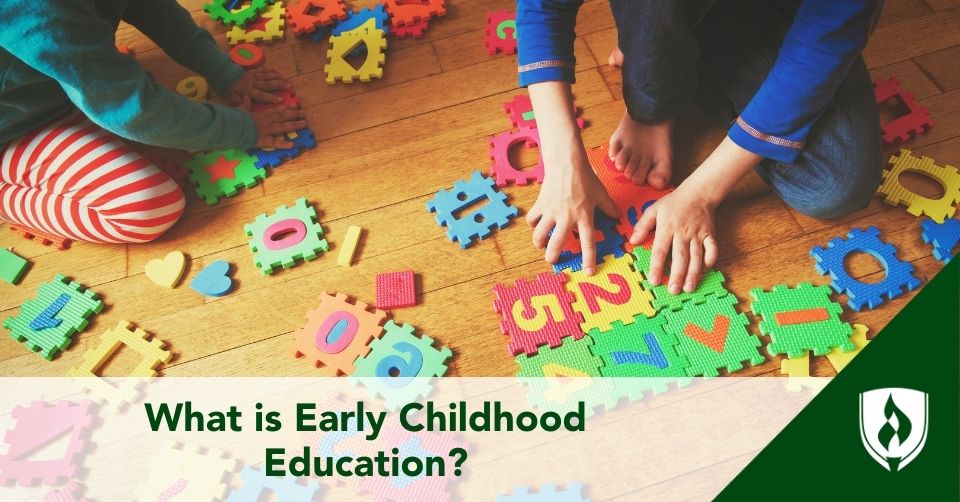What Is Early Childhood Education?
04/10/2025

Early childhood education (ECE) plays a crucial role in shaping a child's development, from birth to age five1, before formal K-12 education. For those interested in pursuing a career in the field, understanding its significance can provide valuable insight into the impact you can have on children's lives.
Whether you're considering a career as an educator, administrator, or support professional, early childhood education offers a variety of opportunities to help shape the future of children and their families. By learning more about ECE, you can begin to appreciate how this foundational stage sets the stage for lifelong learning.
An In-Depth Look at Early Childhood Education
Early childhood education refers to the programs and practices that help guide the growth and development of children2 from birth to age five. These programs range from classroom settings, such as preschool, to informal environments like childcare or daycare centers. They are designed to promote key developmental areas like social, emotional, cognitive, and physical skills.
As someone considering entering this field, it's important to understand that early childhood education isn't just about teaching young children, it's about supporting their journey to becoming well-rounded learners. Whether through structured play-based learning or one-on-one guidance, the goal is to prepare children for future educational success, so they're ready to take on kindergarten and beyond.
The Purpose and Impact of Early Childhood Education
The purpose of early childhood education is to foster foundational skills in children, helping them grow emotionally, socially, and cognitively. ECE programs3 are designed to guide children's learning in a safe and nurturing environment that promotes skills like communication, self-expression, problem-solving, and self-confidence. ECE programs are essential in shaping how children learn and interact with the world around them.
As you explore the possibility of entering this field, it's important to note that research4 consistently shows that children who participate in quality early education programs tend to excel academically and socially in the long term. Your role as an educator can help shape a child's ability to think critically, regulate their emotions, and interact with peers in a positive way.
The Benefits of Early Childhood Education
For anyone interested in early childhood education, it's beneficial to understand how these programs positively influence children's development5.
Studies show that quality early childhood education is associated with:
- Improved academic performance: Children who attend preschool or pre-kindergarten programs are often better prepared for the challenges of primary school and kindergarten classes.
- Better social skills: Early childhood education supports children in developing important social skills, such as cooperation, empathy, and emotional regulation.
- Strong cognitive development: Quality programs stimulate brain development, setting the stage for future learning in schools or social settings.
Characteristics of Quality Early Childhood Education Programs
Quality early childhood education programs6 provide children with enriching learning experiences that combine both structured activities and play-based learning. If you're considering a career in ECE, understanding the qualities that define these programs is essential.
Key characteristics of quality early childhood education programs may include:
- Qualified staff: ECE professionals should be equipped with knowledge about child development and how children learn. You'll need to stay informed about new teaching methods, trends in early childhood education, and relevant policies.
- Developmentally-appropriate curriculum: A quality ECE program provides learning activities that match children's developmental stages. From social skills to language development, the curriculum is designed to support children's individual development.
- Safe and nurturing environment: The physical and emotional environment should be supportive, ensuring children feel secure as they explore, discover, and engage with others.
- Focus on emotional and social development: Quality programs promote emotional development, teaching children how to recognize and express emotions, build friendships, and work collaboratively.
The Role of Early Childhood Educators
As an early childhood educator, your role extends beyond just academic teaching. You'll guide children's emotional, physical, and social growth, helping them learn not just what to think but how to think and interact with the world. It's essential to understand child development to foster an environment where children are encouraged to explore, discover, and express themselves.
Key responsibilities of early childhood educators2 include:
- Supporting social and emotional development: Helping children learn to regulate their emotions and form positive relationships with other children and adults.
- Developing cognitive skills: Through play-based learning and structured activities, you will help children develop problem-solving skills and critical thinking abilities.
- Building strong partnerships with families: Building strong relationships with families allows you to better support a child's growth and ensure continuity in learning at home and at school.
Early Childhood Education Programs and Opportunities
If you're considering a career in ECE, many professionals pursue a bachelor's degree in early childhood education to gain the knowledge and skills needed to create developmentally appropriate learning experiences for young children.
Rasmussen University offers many different education options for students looking to pursue a career as an early childhood educator3. Students will have the opportunity to help shape the futures of young children from birth to age six in a childcare or non-public school setting or leadership role. Additional certification or licensure is required. Rasmussen ECE degrees do not prepare students for licensed positions.
These non-licensure academic programs include:
- An ECE diploma program
- An ECE certificate program
- An ECE associate degree program
- An ECE bachelor's degree program
For those considering a role in ECE, there are a wide variety of programs available across different age groups and settings.
The types of programs available in the field may include:
- Preschools: Programs that focus on children between ages 3-6, often designed to prepare them for kindergarten classes.
- Childcare centers: Providing care and educational opportunities for younger children, from infants to preschool children.
- Head Start programs: Targeting low-income families, these programs provide early education and support to children from birth through preschool.
- After-school programs: Some ECE professionals work with older children in after-school or school-age programs, providing opportunities for continued learning and development.
Some early childhood education professionals work in both the private and public sectors, as well as specialize in areas such as special education, child health, or program administration.
Supporting Early Childhood Education
As a future early childhood educator, it's important to understand that your work not only impacts the lives of individual children but also contributes to broader societal goals. Investing in quality ECE programs1 has been shown to reduce the need for costly special education services and remedial education in the future. In addition, children who receive quality early education are more likely to graduate from high school, pursue higher education, and contribute to a skilled workforce.
Ensuring equitable access to quality early education is essential for children from diverse backgrounds and low-income families. As an ECE professional, you will play a key role in providing educational opportunities to those who might otherwise lack them.
Challenges and Opportunities in Early Childhood Education
While the field of early childhood education presents many opportunities, it also faces several challenges. One of the ongoing challenges is ensuring that all children have access to high-quality instruction. Financial barriers or a lack of available resources may prevent some families from receiving the support they need.
Additionally, there is a shortage of qualified ECE professionals7 to meet the growing demand for early childhood educators, which presents an opportunity for those entering the field to advocate for increased funding, resources, and professional development.
Opportunities for Advancing ECE
- Policy advocacy: Supporting efforts to secure more government funding for ECE programs, which may expand access and improve quality.
- Professional development: Creating more opportunities for ongoing training for early childhood educators, enhancing the skills and qualifications needed to meet the demands of a diverse group of students.
- Community-based initiatives: Encouraging local community involvement in supporting ECE, such as through volunteer programs, mentorship, or partnerships with local businesses.
Pursuing a Career in Early Childhood Education
Early childhood education plays a pivotal role in a child's life, laying the foundation for their future learning and development. As an early childhood educator, you'll have the opportunity to positively shape the academic, social, and emotional growth of young learners, helping them build the skills they need for later success.
Pursuing a role in early childhood education offers a unique chance to make a meaningful impact on children's lives, from the preschool years through to their transition into primary school and beyond. Whether working in preschools, childcare centers, or after-school programs, your work will help provide young learners with the foundational skills needed to succeed in their ongoing educational journey.
1U.S. Administration for Children and Families, Children's Learning and Development Benefits of High-Quality Early Care and Education, at https://acf.gov/opre/report/childrens-learning-and-development-benefits-high-quality-early-care-and-education (visited Mar. 10, 2025).
2U.S. Bureau of Labor Statistics, U.S. Department of Labor, Occupational Outlook Handbook, Preschool Teachers, at https://www.bls.gov/ooh/education-training-and-library/preschool-teachers.htm#tab-2 (visited Mar. 10, 2025).
3Rasmussen University, Early Childhood Education, at https://www.rasmussen.edu/degrees/education/early-childhood-education/ (visited Mar. 10, 2025).
4Tichnor-Wagner, A., & Darling-Hammond, L. (2016). Professional Learning for Early Childhood Educators: The Role of Quality Teacher Preparation in Supporting Children's Learning, Journal of Early Childhood Teacher Education, 37(2), 179-194, at https://www.tandfonline.com/doi/full/10.1080/02568543.2016.1273285 (visited Mar. 10, 2025).
5National Academy of Sciences, Transforming the Workforce for Children Birth Through Age 8: A Unifying Foundation, at https://nap.nationalacademies.org/read/19401/chapter/8#88 (visited Mar. 10, 2025).
6University of Chicago Press, High-Quality Early Childhood Programs: What Makes Them Work, at https://www.google.com/books/edition/High_Quality_Early_Childhood_Programs/CitBDwAAQBAJ?hl=en&gbpv=1&dq=what%20makes%20a%20quality%20early%20childhood%20education%20program&pg=PT17&printsec=frontcover (visited Mar. 10, 2025).
7First Five Years Fund, New Resource Highlights Workforce Crisis in Child Care and Early Education, at https://www.ffyf.org/resources/2024/10/new-resource-highlights-workforce-crisis-in-child-care-and-early-education/ (visited Mar. 10, 2025).



